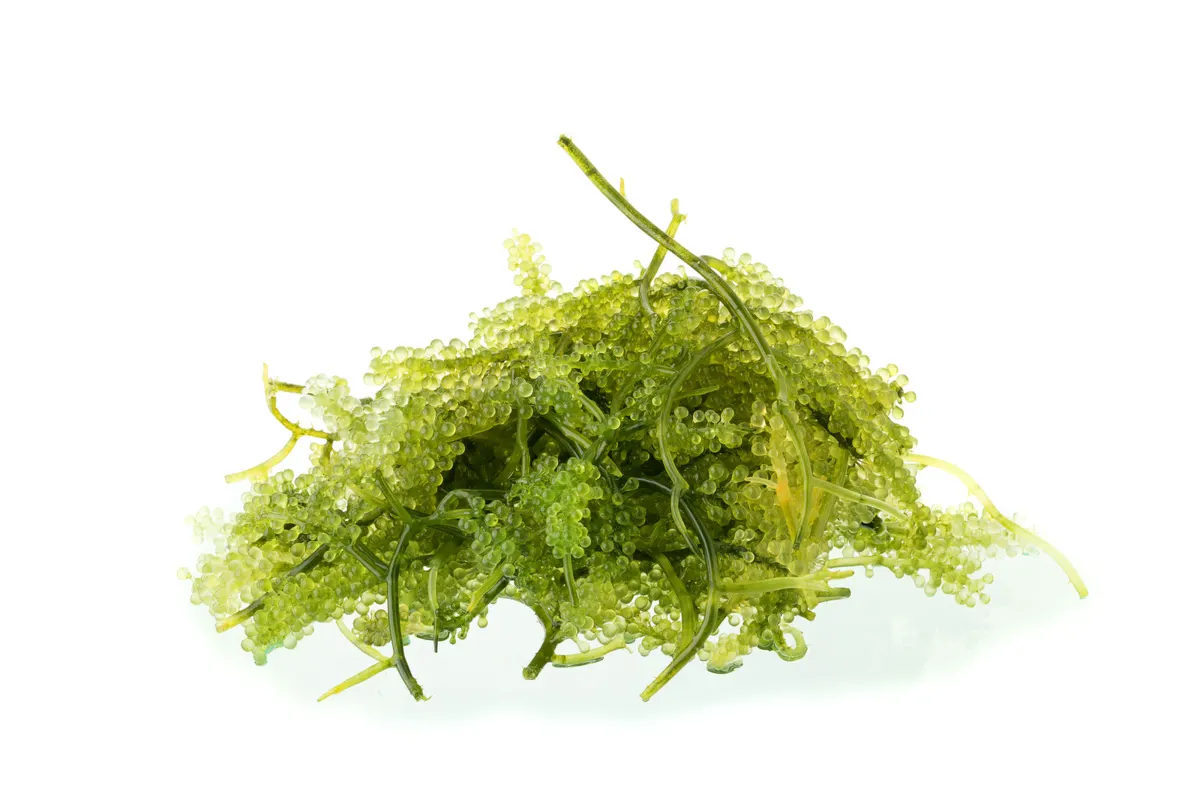For those who venture into the world of health and nutrition, seaweed is no stranger. Often hailed as sea vegetables packed with essential nutrients, it’s not just in sushi rolls anymore. From Japanese cuisine’s seaweed sheets like nori seaweed and wakame seaweed to the seaweed products found in grocery stores, this green vegetable is becoming hugely popular.
Ever wonder if dogs can eat seaweed? If you’re curious whether or not seaweed is safe for dogs, this guide will give you the details.

This post may contain affiliate link(s). As an Amazon Associate, I earn from qualifying purchases.
Seaweed as a food
Seaweed is more than just a sea veggie; it’s a nutritional powerhouse. For humans, seaweed is known to be an excellent source of vitamins (A,B1,B2,C,E, and K), fatty acids and amino acids.
Among the types of seaweed, edible seaweed comes in different varieties:
- wakame
- dulse
- kombu
- kelp
- sea lettuce
- nori
- arame
- chlorella
These are all staples in many cuisines, especially Japanese which often incorporates seaweed paper, and dried seaweed in dishes. Each type of seaweed, whether dried-up seaweed, seaweed sheets or even sea grapes, brings its own set of nutritional benefits.
Is seaweed something dogs can eat?
Many pet owners are tempted to give their dogs scraps from the table or integrate human food into their diet. While some human foods are safe and even beneficial for dogs, others can be harmful.
For instance, while raw fish, often found in sushi alongside seaweed, is rich in Vitamin B and Omega-3 fatty acids, some raw fish can contain parasites harmful to dogs. That’s why we recommend sticking to canned sardines if looking to incorporate fish into your dog’s diet.
Dry seaweed used in human dishes, on the other hand, can contain high levels of salt and potential seasonings that are toxic to dogs. It’s always essential to remember that what’s suitable for human consumption isn’t always fit for our furry friends. Their bodies process substances differently, and even small amounts of certain foods can lead to severe health problems.
Seaweed sheets are a popular and healthy snack for a human but the many flavoring options they come in now and excess of salt on most varieties make them something best avoided when it comes to offering to your dog.
The good news on seaweed
In small amounts, seaweed can be a good thing for your dog’s health. Seaweed, especially wild seaweed, is packed with essential vitamins, fatty acids and amino acids which can bolster your dog’s immune system, promote healthy skin and even aid their digestive tract.
Additionally, the eicosapentaenoic acid (EHA) found in seaweed is beneficial for heart health and red blood cells.
Make sure any seaweed you offer your pup is unadulterated with seasonings or other ingredients.

Potential health implications
While seaweed is packed with vitamin B, amino acids, and other essential nutrients that can bolster a dog’s immune system, too much can introduce health problems.
Excessive seaweed intake can lead to thyroid imbalances due to the iodine content, especially if the seaweed supplements aren’t balanced properly.
How much seaweed is too much seaweed for a dog?
The amount of seaweed you give your pet matters immensely. Brown seaweeds, in particular, are dense in nutrients, which means a little can go a long way.
Always err on the side of caution and introduce seaweed in small doses. Gradually increasing the quantity allows your dog’s digestive system to adapt without being overwhelmed.
While the potential benefits of feeding your dog seaweed are numerous, it’s essential to note, the amount of salt present in some seaweed varieties, can lead to salt toxicity. This is especially of particular concern for small dogs.
How to introduce seaweed into your dog’s diet
Seaweed supplements, specifically designed for canine consumption, are a great option for offering the benefits of this sea vegetable without the potential downsides.
Additionally, mixing ground seaweed with dog food, ensuring it’s evenly spread, can be an efficient method. It’s always a good idea to introduce any new food slowly into your dog’s diet. Here’s how to offer seaweed to your dog:
- Choose the right product: While you might find a variety of seaweed in grocery stores for human consumption, it’s crucial to opt for seaweed products specifically designed for pets. This ensures minimal additives like soy sauce, which isn’t dog-friendly.
- Beware of additional ingredients: Seaweed snacks for humans might contain extra flavorings, which could cause allergic reactions or upset stomach in dogs. Stick to plain seaweed or dog seaweed snacks without additional ingredients.
- Seaweed supplements: Given the health benefits of seaweed, several seaweed supplements for dogs, such as kelp supplements and ascophyllum nodosum, are available in the market. These supplements often present an easier way to incorporate seaweed’s nutritional value without the risks of heavy metals or dangerous toxins.
- Amount matters: For those opting for raw or dried seaweed, always ensure you’re feeding small amounts of seaweed, preferably ground seaweed, into your dog’s meal. Large amounts or whole seaweed can cause intestinal blockage.

Risks and considerations
It’s worth noting that while seaweed is rich in essential nutrients, there are concerns. Beach seaweed, for instance, can cause an upset stomach or even result in an intestinal blockage. Similarly, dried seaweed, if consumed in large amounts, can expand in a dog’s stomach, posing health risks.
Like many types of food, there’s always a risk of allergic reactions. Always monitor your dog after introducing any new food, including seaweed, to their diet.
To feed or not to feed seaweed to your dog?
Seaweed, with its wealth of essential nutrients, can indeed be a great option for dogs, but it comes with caveats. For those looking to enrich their dog’s food with the taste of seaweed, it’s best to start slow, consult a vet, and always opt for products specifically designed for pets.
With the right approach, this ocean vegetable can become a healthy snack for our furry friends, offering them good health and a little taste of the sea at the same time.

